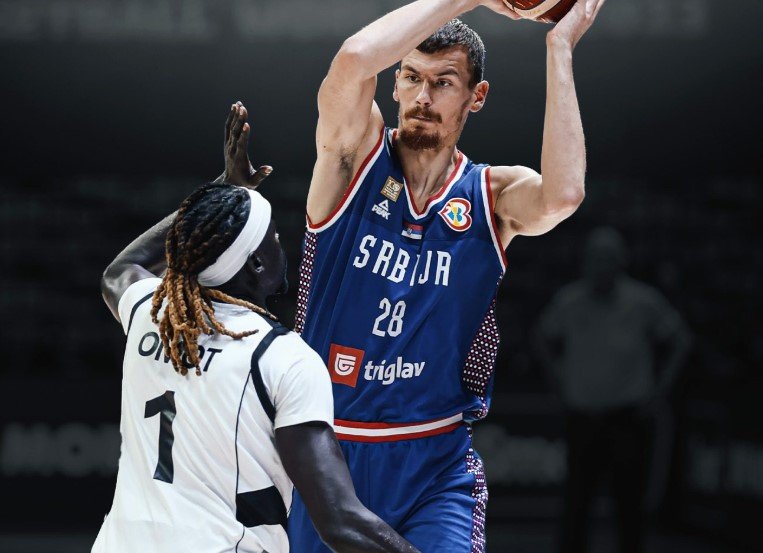South Sudan’s breakout star is bringing big lessons and even bigger ambitions into the next battle. After a groundbreaking Olympic debut, Nuni Omot is laser-focused on turning momentum into medals.
The Paris Games weren’t just another tournament for Omot. They were a turning point. Now, the 6’9” forward is back on African soil, donning a different jersey—this time with Rwanda’s APR in the Basketball Africa League playoffs—while already eyeing his next mission: AfroBasket 2025.
From Refugee Camp to Olympic Court
It’s easy to forget where the journey began when you see a player slicing through defenses under stadium lights. But Omot’s story isn’t one of overnight success.
Born in a refugee camp in Kenya, raised in Minnesota, and now representing South Sudan on international courts—his path has been anything but straightforward.
“There’s something surreal about hearing your country’s anthem on that stage,” Omot said during a break in the BAL playoffs in Pretoria. “I’ve visualized moments like that. But being there, flag on your chest… it hits different.”
One sentence. One moment.
Olympics Changed the Conversation
South Sudan’s Olympic debut in Paris wasn’t just about participation. It was about transformation. And Omot? He was right in the thick of it, averaging 16.7 points, 3.3 rebounds, and 2.7 assists per game.
More importantly, he showed up when it mattered most. Against teams stacked with NBA legends, South Sudan didn’t shrink. They fought. They belonged.
• South Sudan went from global unknowns to fan favorites
• Omot faced off against idols like Kevin Durant
• He proved the talent gap wasn’t a gulf, just a different zip code
“I learned more in one game against those guys than I did in some whole seasons,” Omot said. “The pace, the mentality, the way they prep—it’s levels.”

What Luol Deng Built, The Players Believe
None of this happened by accident. Behind South Sudan’s meteoric rise is Luol Deng—a former NBA All-Star who decided to build something real.
“He didn’t just show up for photo ops,” Omot said of Deng. “He rolled up his sleeves. And people followed that.”
It wasn’t just about building a team, but building trust. Deng helped stitch together a squad scattered across the globe. Many had never played together before the qualifiers. And yet, they clicked.
It worked because it had to.
Now, with AfroBasket looming, Omot says the blueprint won’t change: effort, belief, and pride.
The Shift from Chasers to Champions
It’s a whole different ballgame now.
“At the Olympics, people rooted for us. They saw us as underdogs,” Omot admitted. “Now? Everyone wants to take us down.”
This is new territory for South Sudan. No longer just hopefuls—they’re now defending their spot as Africa’s best. And that comes with pressure.
But pressure doesn’t scare Omot. If anything, it focuses him.
Three short paragraphs—three direct punches.
“We can’t play cute basketball,” he said. “We’ve got to grind. Stay hungry.”
And there’s no shortage of teams ready to test that hunger at AfroBasket.
APR’s Surprise Weapon: Veteran Experience
Right now, though, Omot’s locked in on the BAL playoffs. His current team, Rwanda’s APR, brought him in not just for buckets—but brains.
APR didn’t just sign a scorer. They signed a leader.
“From Day 1, they told me: this is your role. You’re not here to fit in—you’re here to help lead,” Omot said. “And I appreciated that.”
Here’s how he’s performed so far with APR:
| Statistic | Average per Game |
|---|---|
| Points | 19.3 |
| Rebounds | 5.3 |
| Assists | 2.3 |
“I’ve learned championships aren’t won with highlights. They’re won with stops,” he added. “Defense. That’s where it starts.”
Why He Came Back to the Continent
For someone who’s played in Europe, Asia, the U.S. G-League—and even a quick stint in the NBA system—why return to the BAL?
The answer’s simple. And heartfelt.
“I didn’t come back just to hoop. I came back because this is home,” he said. “I want to grow the game here. I want kids to see that you can stay, develop, win.”
One sentence. Pure honesty.
And it’s working. More African stars are staying local, or returning to give back. The BAL, backed by the NBA and FIBA, is changing the landscape.
Omot believes it’s just the beginning.
Mindset Makes the Margin
Against the likes of LeBron, Durant, and Jayson Tatum, the physical talent gap wasn’t shocking. But what stuck with Omot was the mentality.
“Even if you make a mistake, you can’t let it ruin your head,” he said. “You’ve got to believe you’re the best every time you step on that floor.”
For him, the lesson wasn’t how to shoot better or jump higher. It was how to walk into a gym full of legends and still feel like you belong.
That’s the energy he’s bringing to AfroBasket.
Beyond the Court: Building a Legacy
What comes after BAL playoffs? What comes after AfroBasket? For Omot, the vision stretches far beyond medals or trophies.
“I want to scout someday. I want to build academies. I want kids to know that if I made it, they can too.”
You could hear it in his voice—this wasn’t PR spin. This was legacy talk.
He’s not just trying to extend his career. He’s trying to expand Africa’s.
And when asked about the future of African hoops?
“It’s already here,” he said. “People just need to pay attention.”








